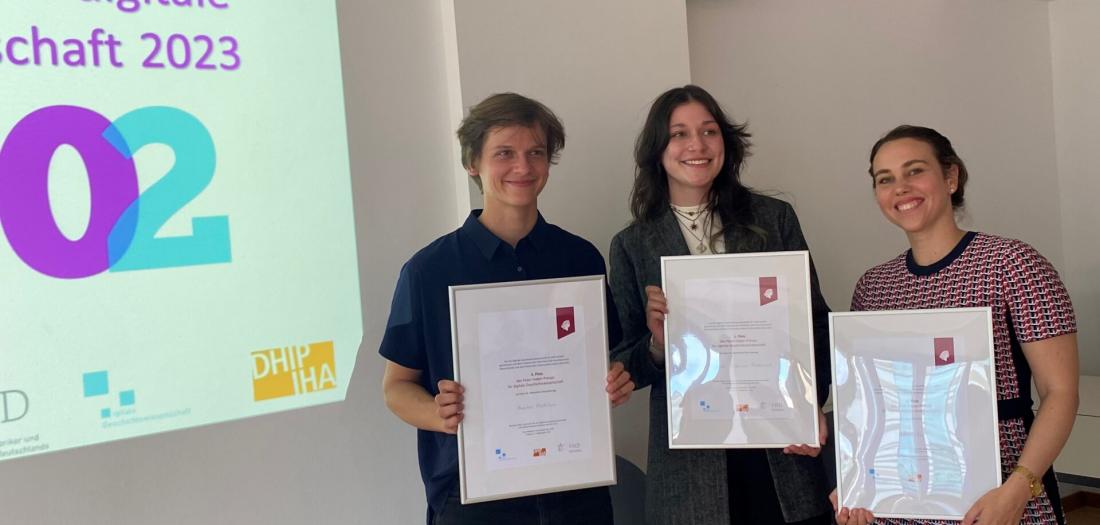Sarah Rebecca Ondraszek and Dr. Joëlle Weis are awarded the Peter Haber Prize for Digital History 2023
17.10.2023 | General, Academic exchange

The winners of the Peter Haber Award 2023 (from left to right): Anika Merklein (3rd prize), Sarah Rebecca Ondraszek (1st prize), Joelle Weis (2nd prize).
At the Digital History conference in Berlin on May 25, 2023, 13 posters were presented for the Peter Haber Prize for Digital History 2023. Based on this conference, seven posters were selected by the audience and a jury for presentation at the Historikertag in Leipzig based on various criteria. Thus, the posters of Sarah Rebecca Ondraszek and Dr. Joëlle Weis were also selected for the "final round".
On September 21, 2023, the student and the research area director presented their posters in a five-minute pitch.
Sarah Rebecca Ondraszek's poster, titled "Wissen vernetzen ist wie Sterne beobachten: Ein Wissensgraph der Korrespondenz Constance de Salm (1767-1845)", won the first place award (available online at https://doi.org/10.5281/zenodo.7804671).
Joëlle Weis's poster, titled "Was hat sie, das ich nicht habe? Fürstinnenbibliotheken des 18. Jahrhunderts im deutschsprachigen Raum", won the second place award (available online at https://doi.org/10.5281/zenodo.7937654).
The TCDH team warmly congratulates both of them on receiving the Peter Haber Prize for Digital History 2023!
About the prize
The Working Group Digitale Geschichtswissenschaft, the Association of Historians of Germany, and the German Historical Institute Paris awarded the Peter Haber Prize for Digital History for the first time in 2021. This tradition will be continued. Prizes will be awarded to three outstanding projects that make an innovative contribution to the subject area of digital historical studies and present it in an original way via a visually appealing poster and a short pitch.
The award commemorates the Swiss historian and private lecturer in general modern history, Peter Haber (1964-2013). His scholarly work and commitment have provided important impulses for digital historical scholarship.
On the occasion of the Historikertag, the Working Group Digitale Geschichtswissenschaft, the Verband der Historikerinnen und Historiker Deutschlands (VHD) and the German Historical Institute Paris announce the Peter Haber Prize for Digital Historical Studies. There is no epochal or methodological focus. Submissions should vividly describe the state of an already ongoing project in digital historical scholarship. Individual projects (e.g. dissertations) can be submitted as well as edition and infrastructure projects or projects for the development of tools. The projects can concern the theory of digital history as well as include methodological or practical components.
The basis for the project presentations are digital posters, which will be shown at the Digital History Conference of the respective year. Here, the pre-selection of the posters takes place, which will then be presented in a short pitch at the Historikertag 2023. A jury will then decide on the placements together with an audience vote. The prize for 1st place is 300€, 2nd place 200€ and 3rd place 100€.
Shortlist of the seven posters of the final round
Anja Bittner, Annelie Große, Lou Klappenbach und Jan Wierzoch: Die Wohntopographie des preußischen Hofes und seiner Nachbarn im 19. Jahrhundert: Daten und Visualisierung, https://zenodo.org/record/7937720
Anika Merklein: Analyse gedruckter Initialen aus der Frühen Neuzeit mit neuronalen Netzen, https://doi.org/10.5281/zenodo.7950688
Sarah Rebecca Ondraszek: Wissen vernetzen ist wie Sterne beobachten: Ein Wissensgraph der Korrespondenz von Constance de Salm (1767-1845), Zenodo https://zenodo.org/record/8304010
Anne Purschwitz: Netzwerke des Wissens – Thematische und personelle Relationen innerhalb der halleschen Zeitungen und Zeitschriften der Aufklärungsepoche (1688-1815), https://zenodo.org/record/7934730#.ZGEBf87P1PY
Ruth Sander und Gaby Huch: Lebenswelten digital: Die Zusammenführung zweier digitaler Editionen, https://zenodo.org/record/7937457
Anna-Lena Schumacher, Tobias Runkel und Daniel Stracke: Geosemantische Kontextualisierung urbaner Räume, https://doi.org/10.5281/zenodo.7946887
Joëlle Weis: Was hat sie, das ich nicht habe? Fürstinnenbibliotheken des 18. Jahrhunderts im deutschsprachigen Raum, https://zenodo.org/record/7937654
Jury
- Dr. Martin Dröge
- Prof. Dr. Torsten Hiltmann
- Marina Lemaire
- Prof. Dr. Ursula Lehmkuhl
- Dr. Anna Menny
- Dr. Katrin Moeller
- Prof. Dr. Silke Schwandt
- Dr. Christian Wachter
- Dr. Jörg Wettlaufer
Source on the Peter-Haber-Price: Peter-Haber-Preis (dhi-paris.fr)
Source for the shortlist of posters and information of the jury: AG Digitale GW, Peter-Haber-Preis für digitale Geschichte 2023: and the winners are…, 26.09.2023, https://digigw.hypotheses.org/4999#more-4999.
Link: Blogartikel der AG Digitale Geschichtswissenschaft im VHD zum Peter-Haber-Preis…

